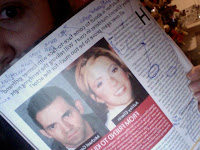Trashy Tabloid Analysis: Star Sources
It is very hard to get through a single tabloid from cover to cover due to the amount of analysis that needs to be done. There are many things than can be focused on, but from pages 1-39 (out of the 84 pages) the biggest thing noticed within this specific tabloid (this may be true of the others, but the analysis is going to be of each single tabloid and then at the end there can be comparisons)is that there are no sources to the stories.
The pages that have been analyzed thoroughly and read are pages 1-39, so this analysis is only for Star Magazine December 27, 2010 issue pages 1-39 with a focus on credibility of sources.
The magazine claims to have so many "Exclusive Interviews," but the only interview that falls under that category is the interview with Kristen StephensonPino. She tells the magazine all about how Johnny Depp is into her and all sorts of things. Of course, the only other sources credited within that article (titled "Johnny Hits On Teen Model") are anonymous sources. Unfortunately, the magazine mentions that she is a "full natural C-cup" before informing readers that Kristen is 19-years-old. So, the fact that she is a full natural C-cup is clearly more important than how old this "teen model" is. Maybe pages 39-84 will be more impressive.
The other articles all had quotes from "insiders" or "pals." How about going out and finding someone who will go on record so that the article can be credible. That's not journalism - that's laziness. Why should anyone trust what is being said by someone who won't even reveal the name publicly. For all we know the "inside source" is some random person on the street that the "reporter" found.
Then there's the cover story about Ashton Kutcher being involved in a "MURDER SCANDAL."
All right - his ex-girlfriend from many years ago had been murdered, and he will apparently be making statements in court regarding what he knew about her and the alleged killer. Also, the magazine calls the alleged killer a "cold-blooded serial killer" without ever saying "allegedly" or anything that could save face.
The entire article has not even a single interview with Ashton Kutcher. So, it's an article about Ashton Kutcher "being involved in a murder scandal," but the only interviews are a Detective and a "friend."
At least attempt to get an interview from someone credible and then put "*CREDIBLE PERSON* was unable to be reached for comment" or "*CREDIBLE PERSON* refused to comment." Something that shows that the reporter isn't just a lazy person who sits around listening to gossip and interviewing random people on the street. Seriously, I feel bad that Dennis had to pay money for this publication. I am glad that the analysis will be thorough, but honestly. This isn't journalism.
The quote from the friend is: "Ashton's worried sick about taking the witness stand."
That is according to "a friend."
Really? Why don't you go ask Ashton himself.
Why doesn't the friend have a name?
This drove me crazy throughout the entire analysis process - which is why I stopped on page 39. I haven't even gotten to the big Tom Cruise - Katie Holmes cover story yet. Fingers are crossed that there is an actual interview done with Tom or Katie and included within the article. Seriously.
If the only "sources" that your publication has are "friends," "pals," "insiders" and "guests" then either your reporters are lazy or no one wants to go on record - if no one wants to go on record and have their name associated with a quote then GO FIND SOMEONE WHO WILL. Go find someone who is willing to have their name printed in the magazine in attribution to the quote. It's understandable to have maybe one anonymous source every so often, but if the ONLY source in your article is an ANONYMOUS source - then you don't have an article. The blogs on the internet have more research and credible sources than that publication which has a paid staff and has a nice readership.
It would be nice to see demographics and statistics of the readership of Star. There is also an article within the first 39 pages regarding one of the stars of MTV's Teen Mom - something to do with her being pregnant again and not knowing who the father is - that didn't have any sources either...
 |
| Nikky Raney reading Star Magazine |
This magazine was the most expensive of the three. This one was $3.99 and the other two were $2.99, but don't worry there's no sales tax in New Hampshire.
Is this publication trying to be a respected news source or is it content with being filled with gossip and unreliable information? It's sad that magazines like Newsweek are faced with tough times in publication - but magazines like Star are selling no problem. There's something wrong with this picture -- and the Future of Journalism needs to fix it.










